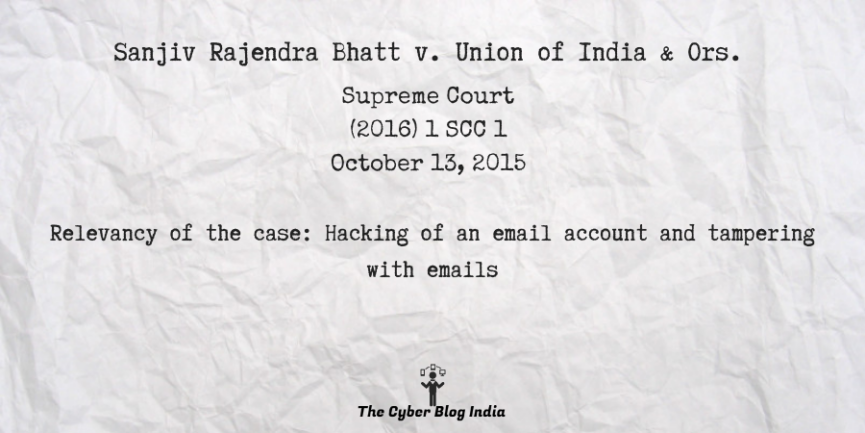Sanjiv Rajendra Bhatt v. Union of India & Ors.

Sanjiv Rajendra Bhatt v. Union of India & Ors.
(2016) 1 SCC 1
In the Supreme Court of India
WP (Crl.) 135/2011 and 204/2011
Before Chief Justice H.L. Dattu and Justice Arun Mishra
Decided on October 13, 2015
Relevancy of the case: Hacking of an email account and tampering with emails
Statutes and Provisions Involved
- The Information Technology Act, 2000 (Section 66)
- The Constitution of India, 1950 (Article 21, 32, 129, 136, 226)
- The Indian Penal Code, 1860 (Section 114, 189, 193, 195, 341, 342, 506)
- The Code of Criminal Procedure, 1973 (Section 160, 164, 173(2))
- The Contempt of Courts Act, 1971 (Section 2, 20)
Relevant Facts of the Case
- The petitioner is an IPS Officer of 1988 batch of Gujrat Cadre and has worked as DCP in the State Intelligence Bureau. Two writ petitions were filed requesting the court to transfer the investigation for FIR registered under Section 66 of the Information Technology Act, 2000 to any independent agency like CBI.
- The State has made allegations that the petitioner has forged and falsified documents of this court and has ulterior motives (conspiring with the opposition political parties, NGOs and activists) for making these allegations.
- The petitioner claims that he was good friends with the Additional Advocate General (AAG) and during 2009 and 2010 while vacationing together he came across his emails, which suggested a conspiracy between the AAG and the others in the administration of justice.
- Despite knowing about the emails and opportunity to reveal the information, the petitioner only revealed them as per his convenience and shared it with media channels to influence the Amicus Curiae appointed by this court to check the investigation done by the Special Investigation Team (SIT) in Jakia Nasim Ahesan v. State of Gujarat.
- The AAG lodged an FIR against the petitioner accusing him of hacking the email account and tampering his emails.
Prominent Arguments by the Advocates
- The petitioner’s counsel submitted that the petitioner had no intention to suppress any information and has filed the full text of exchange of emails. Further, it was stated that the then AAG had voluntarily given the password to the petitioner and there was no question of hacking his email account as they had a close relationship.
- The respondent’s counsel submitted that the petitioner has deliberately misled the court by intentionally avoiding the furnishing of enclosures with the emails. The petitioner appears to be guilty of hacking and tampering with the email account of the then AAG and a scientific investigation shall be made by the State agencies in this regard.
Opinion of the Bench
- The petitioner acted in consultation with the leaders of the rival parties and had exchanged emails with them. The emails also indicate that he tried to invoke media pressure. He sent the email account details of the then AAG to the media channels. Hence, the petitioner had not approached the court with clean hands.
- It did not appear that the email exchanges between the then AAG and other functionaries amounts to causing prejudice in due course of justice.
Final Decision
- Petitions dismissed. No order as to costs.
- The trial court was ordered to proceed as per the law.
This case summary has been prepared by Neelangini Tiwari, an undergraduate student at Kirori Mal College, DU, during her internship with The Cyber Blog India in January/February 2021.
